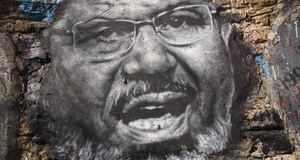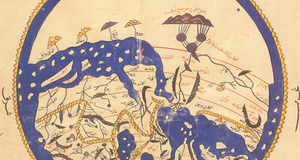From Cornell International Affairs Review VOL. 1 NO. 1Domestic Dynamics of Political Islam in the Greater Middle East: Case Studies of Jordan, Egypt, Kuwait and TurkeyImplications for Western RelationsMany political leaders simply use Islamist rhetoric to win office. Much of this rhetoric feeds off of a latent resentment towards the US due to its support of Israel and its war in Afghanistan. Some political candidates use images of “collateral damage” in Afghanistan as campaign propaganda.32 Once elected, these politicians tend not to implement Islamist policies. Instead, they pursue goals that draw them closer to the West and to the US in particular. A concrete example of this game is the 2003 invasion of Iraq. There is no question that the biggest threat to Kuwaiti security over the years has been Saddam Hussein’s Iraq. Thus, it would serve the secular political interests of Kuwait to enter into an alliance with the United States against Iraq. Kuwait had been a major player in the Iraq containment efforts of the 1990’s and prior to the invasion.33 Yet, Kuwait’s opportunity to be free of the threat of Saddam Hussein came at a time when anti-American sentiments were high. Therefore, an alliance with the United States would have been politically unsustainable. How, then, did the government of Kuwait act in its interest while retaining its legitimacy? The solution to this dilemma was to do both. The government publicly opposed the US led invasion of Iraq. At the same time, it made available 60% of its territory to the Coalition in order to station soldiers and equipment in preparation for the invasion.34 Without the specter of Saddam Hussein, the Kuwaiti regime thought that its sovereignty would be secure. But it now has to face the rising Iran. The crown has a new fear, a repeat of the 1979 Islamic Revolution in Iran. As is the case in Iraq, Kuwait is alarmed at Iran’s pull over the Shia Muslim population. Although Kuwait is a primarily Sunni country, there is concern that a sizeable portion of the population (over 25%) could become controlled by Iran.35 The government of Kuwait is at an extremely perilous junction. The crown has done just enough to retain a sliver of legitimacy among the people. In addition, continued influence from Iran might serve to radicalize the Shia portion of the population, and radical Sunni groups such as al-Qaeda may also gain ground. What would ultimately follow is a destabilization of the entire political and governmental process. Such a rapid dissolution of an already weak authority would be nothing short of disastrous. ConclusionIn each country, political Islamism has evolved as an alternative to the current governments. Islamist political parties advocate governmental reform and an increase in civil liberties which are attractive promises in light of the hardships present in each country. In Turkey, economic troubles have led to an upswing in popular support for the Islamist AKP Party. In Egypt and Kuwait, Islamist groups have gained support as a response to the government’s abuse of power, while in Jordan Islamist groups have gained power because of political liberalization, though they still act as an opposition party. In each case, Islamist parties have gained power because the people want a true change in their governments. It remains to be seen what kind of impact this change will have on the relations between Turkey, Egypt, Kuwait and Jordan and the West. While the US and its European allies stress the benefits of democratic freedoms, it is certain that the rise of Islamist governments throughout the Middle East would be a less than welcome occurrence. In Egypt, the renewed prominence of the Muslim Brotherhood has caused consternation among Western nations that view the group as a terrorist organization, and has lead to speculation that their election could result in sanctions such as those put into place against Palestine upon the election of Hamas; in Kuwait, the specter of losing a key ally in the event of a loss of monarchical power has the US similarly concerned. Yet the shift in power is not always seen as detrimental. In Turkey, for instance, the election of Abdullah Gül signals a renewed vigor in the fight for admittance in the European Union, while in Jordan the message of democratic reform put forth by the leading Islamist groups is met with applause by Western nations. It seems that when the desire for governance by an Islamist party is coupled with the promise to maintain practices seen as beneficial by the West, no problem is likely to arise; but if the party in question seems capable of disrupting the status quo, opposition on the part of the international community will be fierce. Whether these scenarios will play out as anticipated remains to be seen, but it is undeniable that in the face of an unstable international arena, the citizens of the Middle East are once again turning to their faith for guidance. AuthorsAmanda Rudman, Cornell University, Arts and Sciences, 2009; Kevin Schoonover, Cornell University, Arts and Sciences, 2010; Arthur Neron-Bancel, Cornell University, Agriculture, 2009; Israel Barriga, Cornell University, Arts and Sciences, 2009 ReferencesBrown, Nathan. “Pushing Toward Party Politics? Kuwait’s Islamic Constitutional Movement.” Carnegie Endowment for International Peace 79(2007): 3-20. Devi, Sharmila. “Jordan Turns Its Sights on Muslim Brotherhood Domestic Unrest.” Financial Times 23 June 2006: 9. Academic Search Premier. 07 June 2007. Evans-Pritchard, Ambrose. “Turkey’s Muslim millions threaten EU values, says commissioner.” The Telegraph. 08 Sep 2005. 14 June 2007 Gershoni, I. & Jankowski, J. P. Redefining the Egyptian Nation 1930-1945. Cambridge University Press, 2002: Cambridge, UK. ”Jordan Politics: Parties Over.” The Economist Intelligence Unit. 27 Apr. 2007. The Economist. 07 June 2007 Katzman, Kenneth. United States. CRS.CRS Report to Congress. Washington D.C.: GPO, 2005. Landau, Jacob M. “Turkey Between Secularism and Islamism.” Jerusalem Center for Public Affairs. Vol. 352. 16 Feb 1997. Lee, Eric. “Confronting Cairo: Changing an Illusory Democracy.” Harvard International Review. Cambridge: Summer 2006. Vol. 28, Iss. 2; pg. 42, 4 pgs Morrow, Adam. “Egypt: Islamists filled void left by squashed secular opposition.” Global Information Network. New York: Feb 22, 2006. pg. 1 Muravchik, Joshua. “The Trials of Ayman Nour.” Wall Street Journal. (Eastern edition). New York, N.Y.: May 8, 2006. pg. A.18 Smith, Helen. “Gul sworn in as Turkey’s president.” The Guardian. 29 Aug 2007. 19 Sept 2007 Spindle, Bill. “Politics & Economics: Hamas’s Strength Tests Jordan’s Leadership.” The Wall Street Journal 19 Apr. 2006, Eastern ed., sec. A: 6. Academic Search Premier. 07 June 2007. Tavernise, Sabrina, and Bowley, Graham. “Turkish Court Blocks Islamist Candidate.” The New York Times. 01 May 2007. 13 June 2007. Tetreault, Mary Ann. “Stories of Democracy: Politics and Society in contemporary Kuwait.” International Journal of Middle Eastern Studies 33(2001): 661-663. Torchia, Christopher. “Turkish Election a Struggle Over Identity.” Washington Post. 30 April 2007, A10. 14 June 2007. Traub, James. “Islamic Democrats?” New York Times Magazine. New York: Apr 29, 2007. p.44 ”Unbrotherly in Jordan. “ Economist.com / Global Agenda 7 Aug. 2007. ABI/INFORM Global. Academic Search Premier. 07 Sep. 2007:7 Wasey, Adnaan. “Turkey’s Presidential Election Revives Battle Between Religion and State.” NewsHour Extra. 9 May 2007. 13 June 2007 Youmans, Will. “Many oppose changes to Egypt’s constitution.” The Arab American News. Dearborn, Mich.: Mar 31-Apr 6, 2007. Vol. 23, Iss. 1103; pg. 16, 1 pgs Endnotes
Suggested Reading from Inquiries Journal
Inquiries Journal provides undergraduate and graduate students around the world a platform for the wide dissemination of academic work over a range of core disciplines. Representing the work of students from hundreds of institutions around the globe, Inquiries Journal's large database of academic articles is completely free. Learn more | Blog | Submit Latest in International Affairs |



















